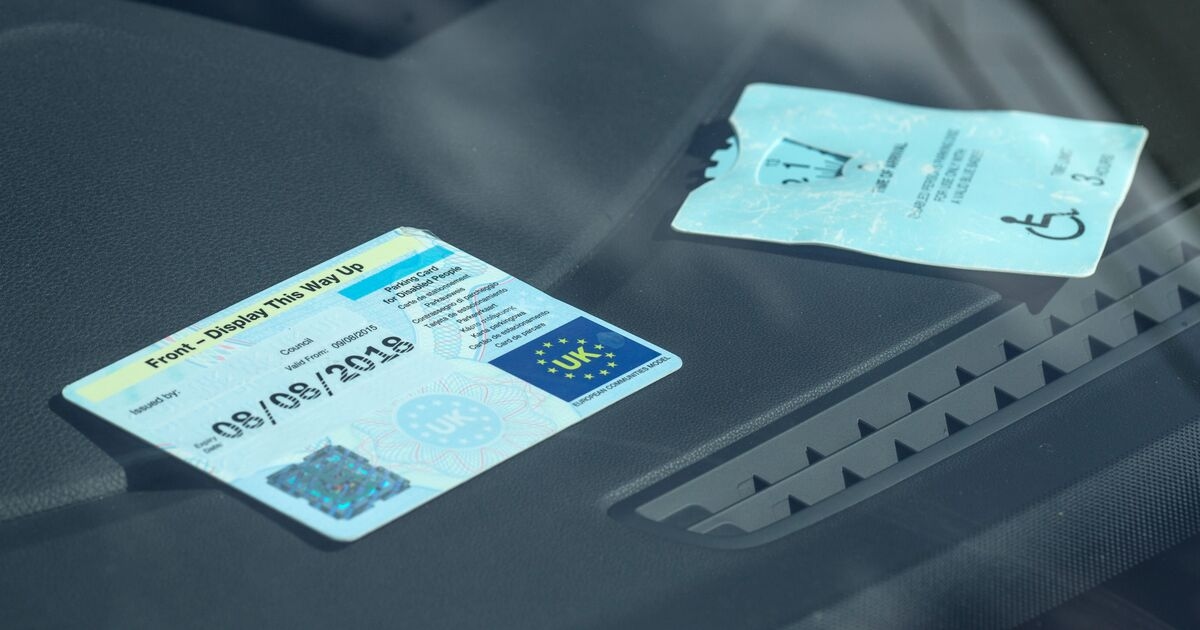Blue Badge holders warned of three-year rule or face breaking the law


Blue Badge holders are reminded they must follow a three-year rule or risk breaking the law. If you fail to renew your disabled parking permit after this period, you could end up using an out-of-date badge, which carries a £1,000 penalty.
Data from the Department for Transport and Transport Scotland reveals there are currently more than 3.2 million Blue Badge holders across England and Scotland.
The criteria for obtaining a Blue Badge were expanded in 2019 to include individuals with hidden disabilities such as Parkinson's, dementia and epilepsy, enabling more people to park closer to their destinations whether they're driving or travelling as a passenger.
A Blue Badge becomes invalid three years after being issued.
However, renewal doesn't happen automatically, meaning those affected must ensure they submit an application for a fresh pass every three years.

Applications must actually be lodged 12 weeks, or three months, before expiry to ensure the new permit arrives before the current one becomes void.
Using an expired Blue Badge is considered "misuse". Transport Scotland guidance states: "Misuse of a badge is a crime. You may be prosecuted if you misuse a badge."
Eligibility for a Blue Badge is also reviewed each time a renewal application is submitted.
Guidance on GOV.UK says: "You must reapply for a Blue Badge before your current one expires. How you pay depends on your local council. They'll usually make a decision within 12 weeks."
A Blue Badge can cost up to £10 in England and Northern Ireland, £20 in Scotland, and is free in Wales. You can reapply for your Blue Badge on the GOV.UK site here.
You will need a recent digital photo showing your head and shoulders. You'll also need a photo or scan of your:
- Proof of identity (such as a birth certificate, passport, or driving licence)
- Proof of address (such as a Council Tax bill or government letter)
- Proof of benefits (if you get any)
You will also need to know:
- Your National Insurance number (if you have one)
- The details of your current Blue Badge
You automatically qualify for a Blue Badge if you are aged three or over and at least one of the following applies:
- You receive the higher rate of the mobility component of the Disability Living Allowance (DLA)
- You receive a Personal Independence Payment (PIP) because you can’t walk more than 50 metres (a score of 8 points or more under the ‘moving around’ activity of the mobility component)
- You are registered blind (severely sight impaired)
- You receive a War Pensioners’ Mobility Supplement
- You have received a lump sum benefit within tariff levels 1 to 8 of the Armed Forces and Reserve Forces (Compensation) Scheme and have been certified as having a permanent and substantial disability that causes inability to walk or very considerable difficulty in walking
- You receive the mobility component of PIP and have obtained 10 points specifically for descriptor E under the ‘planning and following journeys’ activity, on the grounds that you are unable to undertake any journey because it would cause you overwhelming psychological distress
You may be eligible for a badge if one or more of the following applies:
- You cannot walk at all
- You cannot walk without help from someone else or using mobility aids
- You find walking very difficult due to pain, breathlessness or the time it takes
- walking is dangerous to your health and safety
- You have a life limiting illness, which means you cannot walk or find walking very difficult and have a SR1 form
- You have a severe disability in both arms and drive regularly, but cannot operate pay-and-display parking machines
- You have a child under the age of three with a medical condition that means the child always needs to be accompanied by bulky medical equipment
- You have a child under the age of three with a medical condition that means the child must always be kept near a vehicle in case they need emergency medical treatment
- You are constantly a significant risk to yourself or others near vehicles, in traffic or car parks
- You struggle severely to plan or follow a journey
- You find it difficult or impossible to control your actions and lack awareness of the impact you could have on others
- You regularly have intense and overwhelming responses to situations causing temporary loss of behavioural control
- You frequently become extremely anxious or fearful of public/open spaces
For more information, visit the Government website here.
Daily Express





